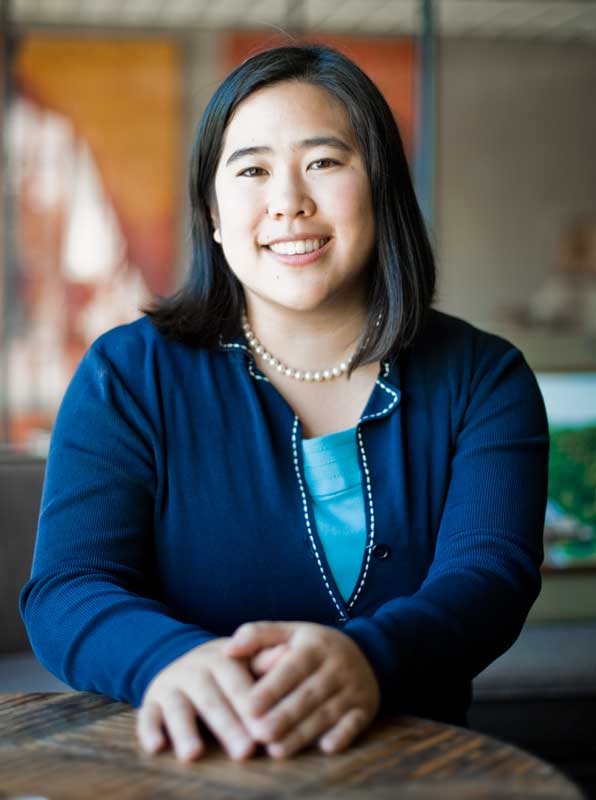Fitchburg, MA: Mayor Lisa Wong
In November 2007, residents of Fitchburg, Massachusetts, overwhelmingly voted for change when they elected Lisa Wong, a 28-year political novice and the daughter of Chinese immigrants, as their mayor. In Wong, Fitchburg, a once thriving manufacturing city whose biggest exports these days are its jobs, gets a leader who matches an expertise in economic development […]

As the former director of Fitchburg’s Redevelopment Authority, Mayor Lisa Wong is spearheading the long-term economic recovery of this venerable industrial city. Her goals include the revitalization of downtown, while preserving its historic character.
Photo Credit : Fasten, LeahIn November 2007, residents of Fitchburg, Massachusetts, overwhelmingly voted for change when they elected Lisa Wong, a 28-year political novice and the daughter of Chinese immigrants, as their mayor. In Wong, Fitchburg, a once thriving manufacturing city whose biggest exports these days are its jobs, gets a leader who matches an expertise in economic development with a passion for the city and its potential.
“My father had two Chinese restaurants, one in Cambridge and then one in Haverhill. Both were on main streets and so that’s where I formed this great love of urban areas. I also got to see what happens to a place, as it did with those two cities, when a lot of good manufacturing jobs leave an area. The disparities between people’s economic circumstances were evident. But then I also saw what happens when a city like Cambridge evolves and changes.
“We’ve lost something like 8,000 manufacturing jobs since the 1960s. That’s a huge number. That’s hundreds of millions of dollars in salaries. That means those people are not redoing their kitchens. They’re not doing their taxes on time or going to local restaurants.
“There’s been talk here about what that magic is to turn things around. What is that big thing? Is it a sports stadium? Is it congressman like a Paul Tsongas who brought in all that money to Lowell? But what people don’t understand is that to get it done it’s really a series of a thousand small steps. And you have to do them all. When you do that you see progress. But if you’re going to sit around waiting for the next big thing, you are going to see a decline. Which is what we’ve seen.
“The vision for a place like Fitchburg has to be comprehensive. I translate it into thinking about a 24-hour day. What are you doing? You’re sleeping, you’re eating, you’re working, you’re walking, you’re talking to people. So, creating safe, walkable streets are just as important as creating a cultural venue. Having local restaurants where people know your name — these are things you experience day-in and day-out. And they help change the psyche. Perception is really what hinders Fitchburg more than reality. Even if you’re in a rinky-dink little restaurant in a strip mall next to the White Hen pantry, knowing the city has a vision is really encouraging.
“I haven’t decided if I like politics or not. I know I like economic development. I know I like being in a leadership and management position. I know I like working on the grass roots level. The politics is just a sort of an added layer and I’m still wrapping my brain around it. Part of it is cultural. Asians normally don’t get involved in politics. But this is the position that has the biggest megaphone to talk about the things I’ve been talking about for a long time. And if I’m the person who is implementing the things we’re trying to do, then I get to help people like my parents.
“If I’m negative, people will be more negative. They look for indicators. Like the old English courts where the judge twitches his nose, or even Alan Greenspan, when he sneezes. What does that mean? His eye is twitching? Does that mean he’s going to raise interest rates? There is a connection. If people want there to be a youthful vitality in the city and they see someone who is young and optimistic who really believes in Fitchburg, that sends a signal: Either, she’s crazy, or, maybe there’s more like her.
“We were once a city that was really prosperous. We had two sitting senators here. We had trains coming in and out of here everyday. We have the space, the layout, and infrastructure. And we have some people who remember how great it was. I go to the senior center and hear them talk about what was once here and I’ll say, ‘You had all the things that I want!’ I said this to a couple of counselors after a meeting. I want what you had as recently as the 1980s. It wasn’t that long ago.
“My Chinese name is Soo Fun. I was at an assembly at a school and I said, ‘Whenever you hear the name “Wong” or “Mayor,” I need you to say “Soo Fun.” ‘ So now whether I go to a fundraiser, or a supermarket, if somebody says ‘Mayor’, I’ll hear this contingency say ‘Soo Fun.’ I love it.”
Yankee article: Mayor of Fitchburg
Ian Aldrich
Ian Aldrich is the Senior Features Editor at Yankee magazine, where he has worked for more for nearly two decades. As the magazine’s staff feature writer, he writes stories that delve deep into issues facing communities throughout New England. In 2019 he received gold in the reporting category at the annual City-Regional Magazine conference for his story on New England’s opioid crisis. Ian’s work has been recognized by both the Best American Sports and Best American Travel Writing anthologies. He lives with his family in Dublin, New Hampshire.
More by Ian Aldrich

